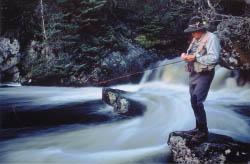Editorial

By Chris Marshall, Alberta, Canada
Publisher Canadian Fly Fisher
As I write this in late January, the temperature is
5 degrees Celsius, the sun is shinning, and the lawn
outside my window is green and snowless. Not exactly
typical for the north shore of Lake Ontario. Similar
unseasonal temperatures have been recorded across
the country for most of January. Naturally, anglers
are concerned about the effect these conditions might
have on fisheries and the fishing tis coming season,
especially those in British Columbia and Alberta, where
a good snowpack is essential for maintaining water
levels in rivers and lakes.
Despite some heated disagreement about the cause, there's
not much doubt that we are experiencing global changes in
climate patterns, and it's also a pretty safe bet that human
produced greenhouse gases are a contributing factor to some
degree. However, there are forces at work here which dwarf
the activities of mere humans, from fluctuations in the energy
output of the sun to the movement of the solar system through
the plane of the galaxy vast, inexorable engines pver which
we have no control whatsoever. There's always been climate
change and there always will be: it's the natural state of
things. Those who convince themselves that we can somehow
stabilize climate through regulating human activity live in
a fools' paradise like Canute on his throne at the edge
of the North Sea commanding the incoming tide to halt.
However, although it's impossible for us to prevent climate
change, we can do something about it. Rather than channeling
our energy in trying to stop it, we should be exploring ways
to prepare for it, ways to adapt. Our fisheries and fishing
are going to change as climate changes. We need to concentrate
on determining the probable effects and measures to alleviate
these.
There's not much fly fishers and other members of the public
can do personally in such an immense task, except support
initiatives by government and other agencies. What we can
take an active part in, however, is about more immediate
threats to our fisheries which are 100% caused by human
activity, such as preserving habitat, regulating aquaculture
to minimize disease, sea-lice and escapees, and, above all,
protecting our supplies of clean water.
Even in this hugely water-rich country, we will run out of
clean, unpolluted water long before we feel any significant
effects from climate change. We're depleting supplies of
fresh water at an alarming rate tapping them at their
sources, natural aquifers and springs. At the same time
we're increasingly contaminating the diminished flows with
agricultural, industrial and urban runoff. We can all take
an active part in working to halt this trend. While plenty
of fly fishers are already involved, too many of us simply
take the rivers, lakes and oceans where we fish for granted,
content to sit back and let others take on the stewardship,
only to whinge that "somebody should be doing something"
when something nasty happens to their cherished fishing hotspots.
Working together in the present to preserve the integrity
of our fisheries can have a significant ameliorating effect
when we begin to grapple with the inevitable challenges of
climate change in the future. ~ Chris Marshall
Credits:
This editorial is from the May/July 2006 issue of
Canadian Fly Fisher. We sincerely thank
Chris for use permission.
Our Man In Canada Archives
|

